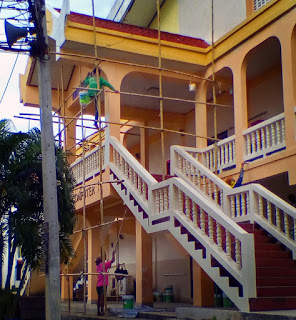As you may already know, Japan is the "Land of the Rising Sun". During my time in South Korea, I discovered that I was in the "Land of the Morning Calm". Now that I reside in Thailand, I've learned that this is the "Land of Smiles". And while that would appear to be so, it is seemingly only true on the surface. Although I'm met with a smile from the majority of Thais, I can't forget that there is a strict hierarchy at work here. The Thai desire to "save face" – or have everything be as non-confrontational and uninsulting as possible – is paramount to each and every one of them. If you were to question or correct someone, you'd certainly be humiliating them. They'd flash that all-too-famous Thai smile while likely burning the bridge between you two.
Being conscious of this behavior causes me to constantly be aware of what I say or what my actions are. Ideally, I'll always err on the side of caution as not to offend. Besides, it's a great lesson in cultural difference if nothing else. There are certain moments, however, when one may be faced with displaying cultural respect or speaking up against an injustice or disservice. This has been my struggle today.
The students at my school not only have native English speakers (like myself) as teachers but Thais who instruct them in English as well. It may seem like an odd concept at first but there's decent reasoning behind it. I can not deliver the proper explanation to why certain English grammar rules exist or work the way they do to students in their native tongue. This allows for much more fluent comprehension (IF done correctly). However, the obvious drawback here is that the Thai teachers' lessons are bound by their own grasp of the English language. Most leave a great deal to be desired. This can and does lead to mistakes being made by the Thais.
While in my office, I was approached by two of my students who wanted to know if an English assignment that I assisted them with had any incorrect answers. Upon first glance, there were a few questions that I would have answered in a different manner and I explained why. The students nodded in agreement and walked away. Shortly thereafter, eight more students entered my office. Same assignment, same questions marked incorrectly. I offered an identical explanation and asked why this was coming up now, knowing that this assignment was completed a month ago. I was informed that the questions were being graded by their Thai teacher, which suddenly brought to light that she was doing so incorrectly. If this teacher is misguiding all of my students, it's likely the same for the entire Matthayom 6 grade level. That's almost 1,000 students misinformed.
No worries though. I'll approach the Thai teacher and inform her of the correct reasoning behind these grammar examples. Thankfully I said this aloud. I was met with all eight students jumping into a frenzy!
"Teacher, no! Please! You can't!" The students assumed that the Thai teacher would know that it was they who questioned her – an absolutely audacious thing to do. The hierarchy system would utterly be thrown askew. And they're not wrong.
So now here I sit...knowing fully well that these students are being led down the wrong path. If I respect the cultural norms, my hands are tied. I can't correct a Thai teacher, I just...couldn't...could I? Should I??



















